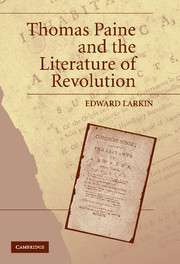Book contents
- Frontmatter
- Contents
- Acknowledgments
- Introduction
- 1 Inventing an American Public: The Pennsylvania Magazine and Revolutionary American Political Discourse
- 2 “Could the Wolf Bleat Like the Lamb”: Paine's Critique of the Early American Public Sphere
- 3 Writing Revolutionary History
- 4 The Science of Revolution: Technological Metaphors and Scientific Methodology in Rights of Man and The Age of Reason
- 5 “Strong Friends and Violent Enemies”: The Historical Construction of Thomas Paine through the Nineteenth Century
- Epilogue: Paine and Nineteenth-Century American Literary History
- Works Cited
- Index
2 - “Could the Wolf Bleat Like the Lamb”: Paine's Critique of the Early American Public Sphere
Published online by Cambridge University Press: 25 July 2009
- Frontmatter
- Contents
- Acknowledgments
- Introduction
- 1 Inventing an American Public: The Pennsylvania Magazine and Revolutionary American Political Discourse
- 2 “Could the Wolf Bleat Like the Lamb”: Paine's Critique of the Early American Public Sphere
- 3 Writing Revolutionary History
- 4 The Science of Revolution: Technological Metaphors and Scientific Methodology in Rights of Man and The Age of Reason
- 5 “Strong Friends and Violent Enemies”: The Historical Construction of Thomas Paine through the Nineteenth Century
- Epilogue: Paine and Nineteenth-Century American Literary History
- Works Cited
- Index
Summary
There never was a man less loved in a place than Payne is in this, having at different times disputed with everybody, the most rational thing he could have done would have been to have died the instant he had finished his Common sense, for he never again will have it in his power to leave the world with so much credit.
Sarah Franklin Bache, January 14, 1781When Thomas Paine arrived in Philadelphia in November 1774, he was an anonymous and penniless immigrant, who, after years of struggling in England as a staymaker, exciseman, teacher, and storekeeper, had decided to try his luck in the colonies. A year later, with the publication of Common Sense, Paine was the toast of Philadelphia. But Paine's popularity was never entirely uncontested. In fact, it would decline rapidly and not recover by his death thirty-four years later. As the epigraph demonstrates, Sarah Franklin Bache characterized Paine's dwindling reputation aptly in a 1781 letter to her father, Benjamin Franklin: From the outset Paine's public role was intricately linked with controversy; the dispute over Common Sense was only the first of Paine's many public battles during his career as a political writer in America. In 1783, in one of his various pleas for remuneration from the Confederation Congress, Paine recounts his initiation into the public arena in less than enthusiastic terms: “Scarcely had I put my foot into the Country but it was set on fire about my ears.
- Type
- Chapter
- Information
- Thomas Paine and the Literature of Revolution , pp. 49 - 85Publisher: Cambridge University PressPrint publication year: 2005



